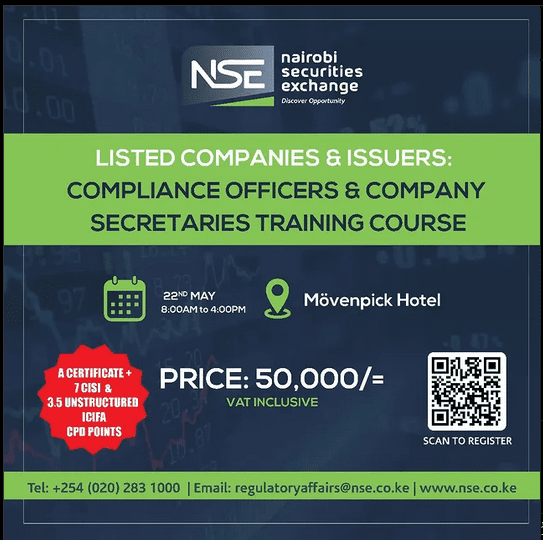The Nairobi Securities Exchange paves the way for radical change by hosting a blockchain compliance training prior to the launch of the Kenya Digital Exchange, blockchain-based platforms to tokenize real-world assets.
Key Takeaways
- The NSE’s one-day NSE Kenya compliance workshop on May 22, 2025, offers an in-depth look at governance, AML/CFT, and regulatory frameworks for tokenized assets.
- Understanding Blockchain regulations in Kenya and RWA tokenization regulations is essential for navigating KDX’s phased rollout, from investor onboarding to secondary market trading.
- Integrating real-world asset tokenization training and AML/CFT training for tokenised assets into your compliance toolkit ensures readiness for emerging digital asset workflows.
NSE’s Blockchain Compliance Training
Kenua is among Africa’s top adopters of Web3, with the nation launching its recent VASP law and various initiatives in adopting Web3. However, Kenya’s digital asset compliance models are still in their nascent stage, a factor NSE is set to mitigate with its one-day NSE Kenya compliance workshop.
Now many of you might wonder, “What does blockchain compliance training mean for me?”, the key lies in the intricate details.
A core concept NSE has pushed during its time with Hedera is leveraging blockchain technology to tokenize real-world assets, an abundant resource in Africa.
Over the years, we have seen how regulatory ignorance can translate into operational and even reputational risks.
Unclear regulations have caused various international initiatives, i.e. Stripe’s stablecoin launch, to forgo major crypto trading regions specifically due to unclear regulations.
Among the core aspects of this training is to elaborate on how RWA tokenization regulations are a gateway to foreign investments and local adoption.
CHECK OUT:Blockchain by Committee: NSE’s Role in Hedera’s Global Network
In anticipation of KDX, NSE intends to ensure the setup is right, and on May 22, 2025, at the Mövenpick Hotel, organizations, companies and regulatory bodies are invited to cover various topics;
- Overview of Kenyan capital markets regulations and Blockchain regulations in Kenya.
- Corporate governance, internal controls, and best practices in token issuance.
- AML/CFT training for tokenized assets, reflecting recent legislative updates.
NSE has partnered with Sovfi to design KDX, hence the blockchain compliance training will educate on RWA tokenization regulations, i.e. equities, debts and commodities.
The first phase will focus more on investor onboarding and the nuances regarding compliance. Subsequent phases will elaborate on a pilot trading project and exchange-traded products that will feature within KDX.
What Are the Implications?
For Compliance Officers and Legal Teams
Compliance is a major hurdle within the industry, with Africa now gearing up to overhaul its adoption rate. Tokenization, a core application of digital assets, demands rethinking due diligence workflows.
It’s directly tied to real-world assets, which often demand more from KYC/AML pipelines, in which on-chain analytics and smart contract audits often apply.’

NSE’s workshop accelerates your compliance toolkit, unlocking faster market entry and trust.[Photo: Instagram]
For Corporate Governance
Blockchain regulations in Kenya are developing a frontier, and getting in quick is a significant boost for corporates and organizations.
Board members will gain insight into embedding internal controls within a decentralized system providing automated governance.
This enhances productivity and provides a level of automation that is less cumbersome than a traditional system.
In blockchain, the chain of custody is confined to smart contracts, allowing for the streamlining of processes.
For Investors and Traders
Understanding Kenya’s digital asset compliance means recognizing how regulatory clarity can unlock liquidity in tokenized instruments.
As KDX phases in secondary trading, investors who grasp RWA tokenization regulations will spot arbitrage and yield opportunities that others miss.
Why It Matters: Practical Next Steps
- Register Early: With limited space and the deadline nearing, visit the NSE Training portal or email training@nse.co.ke to secure your seat.
- Engage with Case Studies: Review recent tokenization launches, citing successes and setbacks. Africa’s resource-rich landscape provides ample ground for RWA platforms, but nuances in regulations, marketing, and education often hinder progress.
- Develop Internal Playbooks: With increased focus on anti-money-laundering and countering finance teroris drafting a checklist that complies with these ruleset can pretty much give you a headstart.
- Network with Peers: Networking is a core aspect of the Web3 industry. The NSE Kenya blockchain workshop might appear as a training ground, but it’s a prime opportunity to network with peers within the blockchain industry and those interested.
Risk Disclaimer: Various risk elements still exist despite RWA tokenization regulations. Aspects like smart contract vulnerabilities, interoperability challenges, and potential regulatory shifts, hence rigid audits save a lot of trouble.
Reflecting on Kenya’s Blockchain Journey
Kenya’s proactive stance in launching KDX, VASP bills, and providing a blockchain compliance training underscores its innate agenda of dominating the space.
For professionals in finance, compliance, blockchain development, and investment, this training is an opportune moment to understand blockchain regulation in Kenya, network, and develop collaboration that benefits everyone in the long run.
Time is ticking, but there is still space left. It’s more beneficial to jump up and see where you can envision or learn with the training drawing nearer.

